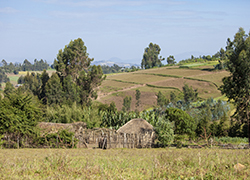Interlinking Insurance and Credit for Agriculture in Ethopia
Researchers: Craig McIntosh (GPS), Assefa Admassie (Ethiopian Economics Association), Shukri Ahmed (FAO), and Aleko Sarris (University of Athens)
Location: Ethiopia

Although total agricultural output has risen in the past decade, food production in several African countries has not kept up with the increase in population, and food security remains a pressing issue.
When used correctly, inputs such as fertilizer and improved seeds can raise agricultural yields, yet adoption of such inputs remains low in many African countries. A possible explanation is that farmers are averse to the risks associated with adopting new agricultural inputs, and may not have the cash available to finance new inputs or cushion financial loss.
The most straightforward policy intervention to protect farmers against such risks would appear to be insurance indexed to local weather conditions, but when such products have been introduced in the field, there has typically been low uptake.
To investigate whether a simultaneous provision of credit and weather indexed insurance can improve uptake of inputs including fertilizer and improved seeds, the research team implemented a two-armed randomized evaluation in collaboration with Ethiopia’s largest private-sector bank, Dashen Bank, and a major private insurance company, Nyala Insurance.
A baseline survey and three years of household surveys tracked farmer behavior throughout the study. In an additional, individual-level experiment, a subset of households were offered randomly allocated insurance purchase vouchers ranging from 0 to 500 Birr. These vouchers were distributed before the time of the marketing campaign, and could be redeemed if the household bought weather insurance.
Results
The study found that while the stated demand for index insurance was high, when farmers were offered the actual product, demand was lower and was significantly influenced by the availability and amount of subsidy vouchers. Given that most states in Ethiopia are now moving away from the subsidization of credit for agricultural inputs, finding innovative ways to pull private credit into smallholder agriculture and to protect farmers from weather-related default risk appears to be particularly timely.
The overall conclusion from the insurance purchases in the study is that some factor is prohibitive to purchases in the greater population, and that insurance demand proves to be highly responsive to the existence and amount of randomly allocated insurance vouchers.
Related Publications
Ahmed, Shukri, Craig McIntosh, and Alexandros Sarris. 2017. "The Impact of Commercial Rainfall Index Insurance: Experimental Evidence from Ethiopia." Working paper, August.

